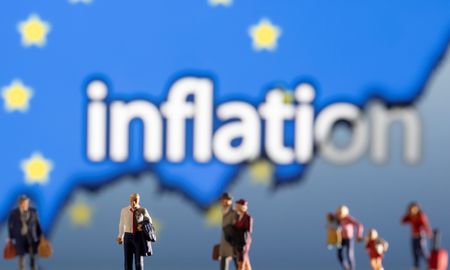By Jan Strupczewski
BRUSSELS (Reuters) – Euro zone economic growth is likely to be stronger than expected this year while inflation will be lower than in forecasts made towards the end of 2022, the European Commission said on Monday.
The EU executive arm said economic growth in the 20 countries using the euro was likely to be 0.9% this year, rather than the 0.3% predicted last November.
Euro zone finance ministers will discuss the more upbeat economic outlook at a meeting later on Monday against the backdrop of very low unemployment that was hardly changed by the slower growth at the end of 2022.
“Employment in the euro area has been incredibly resilient in face of the economic consequences of the war,” the chairman of euro zone finance ministers Paschal Donohoe said on entering the ministers’ talks.
Euro zone unemployment was 6.6% in December 2022, unchanged from November and down from 7.0% a year earlier.
“Overall, these forecasts point to a euro area that has maintained its resilience, despite the incredible economic shocks of recent years,” Donohoe said.
The Commission said that despite earlier concerns, the single currency area would narrowly avoid a technical recession, as growth in the last three months of 2022 was 0.1% quarter-on-quarter and likely be 0.0% in the first three months of 2023.
The Commission said uncertainty surrounding the forecast was high, but risks to growth were broadly balanced.
“Domestic demand could turn out higher than projected if the recent declines in wholesale gas prices pass through to consumer prices more strongly and consumption proves more resilient,” it said.
“Nonetheless, a potential reversal of that fall cannot be ruled out in the context of continued geopolitical tensions,” it said.
The Commission said external demand could also turn out to be more robust following China’s re-opening – which could, however, fuel global inflation, but that risks to inflation were largely linked to developments in energy markets.
Euro zone consumer inflation, which hit record highs of 10.6% last October on a surge in energy and food prices caused by the Russian invasion of Ukraine, is to forecast to decelerate to 5.6% this year and 2.5% in 2024.
This would be a greater deceleration than the previously expected 6.1% for 2023 and 2.6% for 2024.
“This forecast crucially hinges on the purely technical assumption that Russia’s aggression of Ukraine will not escalate but will continue throughout the forecast horizon,” the Commission said.
(Reporting by Jan Strupczewski; editing by Philip Blenkinsop and Alex Richardson)


